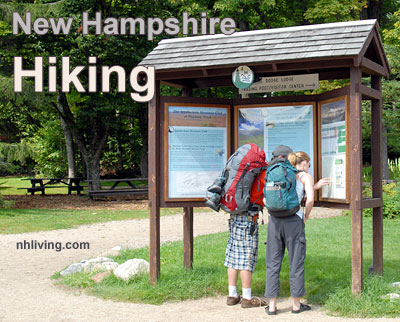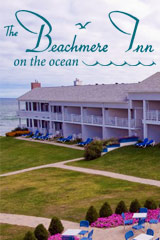NH Endangered & Dangerous Plants
NH Hikers Watch Out for These Rare & Threatened Plants
 There are several threatened and dangerous plants in the woods of New Hampshire. The Granite state is however, is an ideal choice for your hiking vacation. More than 500,000 people visit New Hampshire to hike every year. Take a moment to learn about New Hampshire’s Endangered Plants. Ask about NH endangered plants or share trail comments. To feature your business in NHLiving, contact us.
There are several threatened and dangerous plants in the woods of New Hampshire. The Granite state is however, is an ideal choice for your hiking vacation. More than 500,000 people visit New Hampshire to hike every year. Take a moment to learn about New Hampshire’s Endangered Plants. Ask about NH endangered plants or share trail comments. To feature your business in NHLiving, contact us.
NH Forests: Endangered Plants

Franconia Inn, 1300 Easton Rd., Franconia, NH 03580 | 603-823-5542
"In the Land of Big Mountains and Small Villages." Nestled in the heart of the beautiful White Mountains of New Hampshire, The Franconia Inn is a full service country inn, where casual elegance and exquisite cuisine are just waiting to welcome you. Please visit our website for more information.
Visit Franconia Inn - Franconia, NH

Partridge Cabins, 3 Partridge Road, US Route 3, Pittsburg, NH 03592 | Ph: 603-538-6380
Visit Partridge Cabins and Lodge - the four season place to be. We have 600 feet of lake frontage, and offer housekeeping cabins situated amidst the shade of sheltering spruce and fir trees. Completely winterized cabins with gas heaters, private baths, with hot and cold running water, electricity, and full kitchen facilities. All cabins are attractively furnished, and accommodate 4-8 people. Snowmobile, cross-country ski, hike, moose watch, and let's not forget fishing and hunting! Summer, fall, winter, and spring, you will find Partridge Lodge & Cabins most pleasing.
Visit Partridge Cabins - Pittsburg, NH

Cabot Inn & Suites, 200 Main Street, Lancaster, NH 03584 | 603-788-3346
A four-season family resort located in the heart of the White Mountains, over-looking the Presidential Range. Cabin Inn & Suites features a fitness center, indoor pool, banquet hall, and 60+ acres, with breathtaking views of the mountains. Bretton Woods, Cannon, Wildcat, Attitash, Loon, Black Mountain, Cranmore ski areas nearby. Family restaurant and lounge. Indoor heated pool, game room, outdoor playground, video game hook-ups. Santa’s Village, Six Gun City, Story Land, Whale’s Tale Water park a short drive away.
Visit Cabot Inn & Suites - Lancaster, NH

Inn at Ellis River House B&B Inn, 17 Harriman Road, Jackson, NH 03846 | 603-383-9339
Enchanting Country Inn offering "Romance & Rejuvenation" on the river in the heart of the White Mountains. 20 rooms and cottage are beautifully appointed with period and modern amenities. Many have Jacuzzis for two and/or balconies, most have fireplaces. Gourmet country breakfast and afternoon refreshments included. Enjoy the cozy game room/pub, hot tub, sauna, and outdoor heated pool. Relax, re-discover lifes simple pleasures, hike, fish, golf nearby, cross country or downhill ski, outlet shop and more. Let the Inn at Ellis River rejuvenate your spirits!
Visit Inn at Ellis River - Jackson. NH

Swiss Chalet Village Inn, 457 Intervale Resort Loop, Intervale, NH 03845 | 800-831-2727
The Swiss Chalet Village Inn offers comfortable lodging at an affordable price. Choose from a wide variety of rooms to meet your needs. Wheather you are here for a family outing, wedding, business or pleasure, you will find clean, comfortable White Mountain lodging. Pet Friendly Rooms available. Please inquire.
Visit Swiss Chalet Village Inn - Intervale, NH

The Valley Inn, Ascend Hotel Collection, 17 Tecumseh Road, Waterville Valley, NH 03215
Escape to The Valley Inn in Waterville Valley, NH, where mountain charm meets modern comfort. Nestled in the heart of the White Mountains, this cozy retreat offers breathtaking views, easy access to outdoor adventures, and a welcoming atmosphere for families and couples alike. Whether you're skiing in winter, hiking in summer, or simply relaxing, The Valley Inn is your perfect getaway destination! Check availability and current specials below.
Waterville Valley Resort, The Valley Inn, Waterville Valley, NH
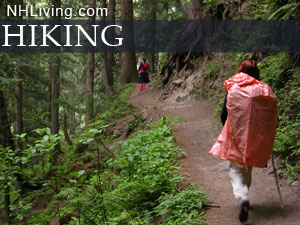 Hiking in the woods and mountains of Northern New England can be wonderful. Unfortunately, not every plant in the wilderness is your friend. Learning to recognize certain important plants can help you enjoy the experience. One of the most common plants that all hikers should avoid is poison ivy. Most people are allergic to urushiol, a substance found on poison ivy leaves. For these people, contact with the plant can cause an itchy rash and swelling, particuarly around the eyelid. Poison ivy is a climbing vine with glossy leaves that can be red in the spring, green during the summer, and yellow or orange in the fall. Poison ivy has three leaves, so as the old saying goes, “leaves of three, let it be.” In order to minimize your exposure to poison ivy, wear gloves and long pants when you go into the woods. If you know poison ivy grows on your property, get rid of it. Whatever you do, don’t burn the plants. Breathing in the smoke can cause a severe reaction.
Hiking in the woods and mountains of Northern New England can be wonderful. Unfortunately, not every plant in the wilderness is your friend. Learning to recognize certain important plants can help you enjoy the experience. One of the most common plants that all hikers should avoid is poison ivy. Most people are allergic to urushiol, a substance found on poison ivy leaves. For these people, contact with the plant can cause an itchy rash and swelling, particuarly around the eyelid. Poison ivy is a climbing vine with glossy leaves that can be red in the spring, green during the summer, and yellow or orange in the fall. Poison ivy has three leaves, so as the old saying goes, “leaves of three, let it be.” In order to minimize your exposure to poison ivy, wear gloves and long pants when you go into the woods. If you know poison ivy grows on your property, get rid of it. Whatever you do, don’t burn the plants. Breathing in the smoke can cause a severe reaction.
If you think you were exposed to poison ivy, you should try to remove all traces of the oil. Rinse the affected area with soap and water, but don’t wipe with a cloth. Be sure to wash the clothes you were wearing. You shouldn’t scratch, but not because it will spread the rash. Once the reaction appears, you cannot spread it to other people or other parts of your body, but scratching could cause an infection. Aloe vera or calamine lotions and oral antihistimines such as Benadryl can reduce the itch, but they won’t help your skin heal faster. People with particularly severe reactions should see a doctor. They may be prescribed a steroid cream, or even a steroid pill if a large part of the body is affected. Steroids both relieve the itch and shorten the duration of the rash, but they are powerful drugs and many doctors are reluctant to over-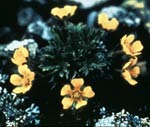 prescribe them.
prescribe them.
Hikers should also be mindful of endangered plants. Hundreds of New England plant species are threatened. Robbins’ Cinquefoil is a small yellow wildflower found only above the treeline in NH’s White Mountain National Forest. Hikers on the Appalachian Trail had trampled the Robbins’ Cinquefoil, but an awareness campaign has helped protect these fragile plants and they are no longer on the endangered list. Two endangered plants in alpine regions of New Hampshire are the mountain avens  (geum peckii) and the pale painted cup (castillega settentrionalis). The mountain avens is another small yellow flower, and it is globally rare. The plant is found only in certain areas of the White Mountains and Nova Scotia. The pale painted cup is common worldwide, but rare in New England. All plants above the treeline tend to be vulnerable because their environment is already so precarious. It is a good idea to avoid walking on any of them, even if they look like weeds or ordinary wildflowers.
(geum peckii) and the pale painted cup (castillega settentrionalis). The mountain avens is another small yellow flower, and it is globally rare. The plant is found only in certain areas of the White Mountains and Nova Scotia. The pale painted cup is common worldwide, but rare in New England. All plants above the treeline tend to be vulnerable because their environment is already so precarious. It is a good idea to avoid walking on any of them, even if they look like weeds or ordinary wildflowers.
If you see a particularly pretty flower, resist the urge to pick it — if the flower is endangered, picking it could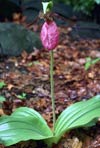 be against the law. New Hampshire’s state wildflower, the pink lady’s slipper, is the only form of lady’s slipper not officially endangered in New Hampshire, but it is still illegal to pick. In fact, the flower is listed as a “plant of special concern” because it was so pretty, people were over-picking it. A type of wild orchid, the lady’s slipper is 6 to 15 inches tall and blooms from April to July. If you see a lady slipper growing naturally, do not attempt to transplant it. The pink lady’s slipper was adopted as the official state wildflower of New Hampshire in 1991. New Hampshire’s pink lady’s slipper is also sometimes called the moccasin flower, the lady’s slipper orchid, the lady’s-slipper orchid, pink ladyslipper, and pink lady’s-slipper.
be against the law. New Hampshire’s state wildflower, the pink lady’s slipper, is the only form of lady’s slipper not officially endangered in New Hampshire, but it is still illegal to pick. In fact, the flower is listed as a “plant of special concern” because it was so pretty, people were over-picking it. A type of wild orchid, the lady’s slipper is 6 to 15 inches tall and blooms from April to July. If you see a lady slipper growing naturally, do not attempt to transplant it. The pink lady’s slipper was adopted as the official state wildflower of New Hampshire in 1991. New Hampshire’s pink lady’s slipper is also sometimes called the moccasin flower, the lady’s slipper orchid, the lady’s-slipper orchid, pink ladyslipper, and pink lady’s-slipper.
In New Hampshire, the Native Plant Protection Act of 1987 allows landowners to do whatever they like with endangered plants growing on their property. However, if you are on someone else’s property, you should get the owner’s permission before picking or digging up any plants. You should get the government’s permission before interfering with plants in public parks and forests.
Giant hogweed is a noxious plant that has recently been spotted in New Hampshire. The sap can cause large painful blisters and even blindness if it gets in the eyes. It is a huge plant (10- 15 feet tall) with hollow stems and reddish purple spots and bristles. A less noxious plant called cow parsnip can often be mistaken for giant hogweed. If you see what you think may be giant hogweed, call the New Hampshire Department of Agriculture. Giant hogweed is one of 17 notoriously invasive plants that are now illegal to collect, transport, sell, or transplant in New Hampshire. These simple precautions can help ensure that your hiking experience is enjoyable and that the beautiful plants you encounter will be around for other people to enjoy.
~ Jenn. for nhliving.com


